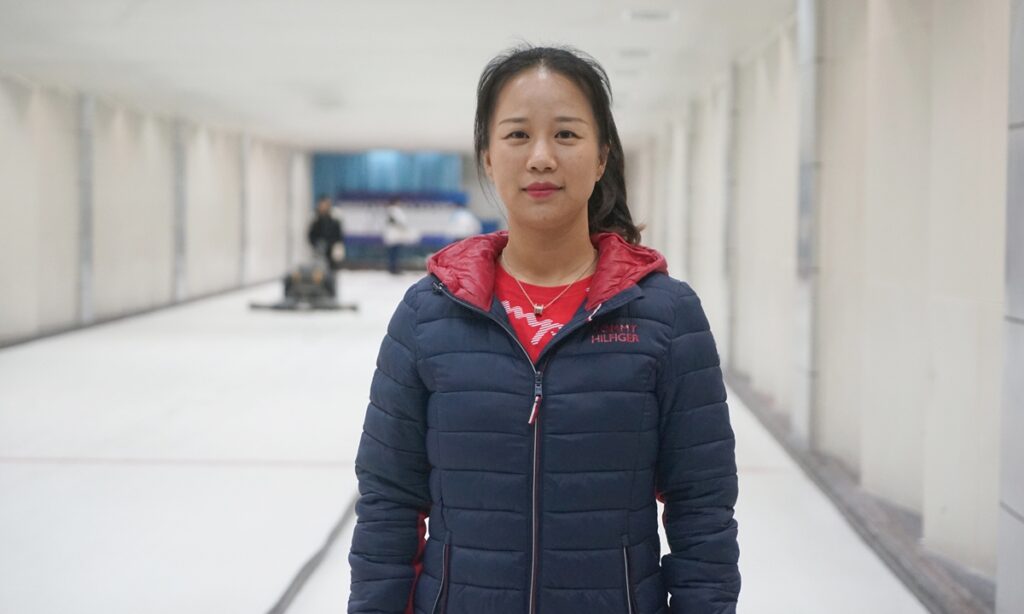As 10 students stand at the curling track at a sports center in Shanghai, a team leader gives out instructions, a male student measures the distance, and others watch the curling competition in anticipation.
“Go!” At the team leader’s command, the male student pushes forward the red curling stone, successfully attacking the circle area at the track’s end, winning a point.
“Good job!” Li Lingshu gave a thumbs up and continued to give them more instructions and correct their gestures. Li, 35, born in Shanghai, is currently an associate professor of physical education at Shanghai International Studies University and an ice and snow sports expert. She has a special identity.
Li and three other Chinese have been awarded positions as technical officials at the Olympic and Paralympic Winter Games Beijing 2022 while Li will act as deputy chief timer, the first time that Chinese will work as curling umpires in the Winter Olympic Games.
I was “lucky to be chosen” as one of the coaches for curling training in 2011, Li told the Global Times. At the beginning, most Chinese “knew little” about curling while the sports were more popular among countries such as Canada.
With curiosity, “my class would be full within 5 minutes after I opened the class,” Li said, noting that the curling class was quite popular among students as her campus female team had performed well and has been champion for three consecutive years in the college league in Shanghai.
Rising interest in curling
When talking about the Olympics, Li couldn’t hide her excitement. Her major job is working as a deputy chief timer to manage all the timing technicians.
“Timing technique is very important in each game,” for instance, thinking time can affect the progress of each team member, Li said, noting that it’s very important to keep a fair timing mechanism for each athlete. She has once worked with a German chief timer, and their job was to ensure every timer worked well and all the equipment worked smoothly.
“As an international umpire, I will behave well and try my best because I will represent the image of China,” Li said with confidence.
Also, the Winter Olympics will be a window for the outside to know more about China as well as a good chance for more and more Chinese residents to watch and enjoy winter sports, Li smiled. Although she is a new mother, Li still spends her spare time holding curling competitions for disabled groups.
“Disabled people can find happiness and excitement through sports, like all of us, which also makes me happy,” Li noted. When working at the sports site, Li is full of energy to give instructions to help those in need.
Beijing’s successful bid to host the 2022 Winter Olympics also helped to accelerate the development of winter sports in China. There are many people working like Li to improve Chinese winter sports. The Winter Sports Development Plan (2016-25) issued in 2016 by the Chinese government is a long-term plan that aims to increase people’s interest in winter sports and engage some 300 million people in ice and snow sports by the end of 2025.
Taking the Beijing 2022 Winter Olympics as an opportunity, “it can drive the ice and snow industry chain,” especially in the Yangtze River Delta region. The industry has been promoted well on track, Shi Chunyan, a member of the ice and snow sports experts committee under the Ministry of the Education, told the Global Times.
In 1996, China had only 11 ski resorts, however, it had over 700 ski resorts some 20 years later, according to a report by Xinhua News Agency in December 2020. What’s more, the number of companies engaged in China’s winter sports industry climbed to 4,650 in 2020 from 1,950 in 2015, according to media reports.
However, in the southern regions, some substitute sports such as floor curling and roller skating have also emerged due to venue limitation as these sports boast advantages such as low cost, wide access to all ages and safety, according to Shi.
“I feel in love with the sport,” a high school student surnamed Liu, who was practicing curling with her team members, told the Global Times. It’s not easy to be a professional curling athlete due to the sport’s strict physical requirements, Liu said, noting that she has a dream to be a curling umpire.
Li Lingshu at a curling site in Shanghai. Li will act as deputy chief timer, the first time that a Chinese will work as a curling umpire in the Winter Olympic Games. Photo: Chen Xia/GT



